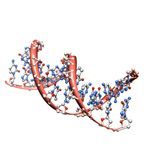New Genetic Links to Colorectal Cancer Identified
Using a large genome-wide study of more than 28,000 individuals, three new genetic links to colorectal cancer have been identified, holding the potential for new therapeutic targets.
Three new genetic links to colorectal cancer have been identified using a large genome-wide study of more than 28,000 individuals. The three new variants may hold potential new therapeutic targets and are helping researchers better understand the biology of colorectal cancer as well as the differential genetic basis of colorectal cancer in European and Asian populations. The study is published in Nature Genetics.

Researchers at the Vanderbilt-Ingram Cancer Center in Nashville, and colleagues in China, South Korea, and Japan analyzed 5,252 colorectal cancer cases and 9,071 control samples from the Asia Colorectal Cancer Consortium (ACCC) to identify novel colorectal cancer risk factors. The samples studied came from China, Japan, and Korea. The results were compared to the known genetic variants identified from European population results.
“This kind of work would not be possible without the support of investigators from multiple centers,” said Wei Zheng, MD, PhD, an Ingram professor of cancer research and lead author of the study.
The top four genetic loci were compared to two previous data sets-the Genetics and Epidemiology of Colorectal Cancer Consortium (GECCO) and the Colon Cancer Family Registry (CCFR). Three of these were within the previous data sets but there were not enough data for strong associations. The current study has found the “needles in a haystack,” said Zheng, by rigorously testing the results to identify true associations using the genome-wide association study data that can identify more than 25,000 variants, many of which are false positives.
“A lot of work has been done in European descendants,” said Zheng. “Our study is the first one conducted in multiple East Asian populations. Looking at different ethnic groups is important because the genetic structures can be different enough that variants identified in one population do not explain risk in other populations Sometimes-it is much easier to identify some genetic variants in East Asian populations than European descendants.”
One of the loci is in close proximity to the CCND2 gene, a cyclin that has a critical role in cell cycle progression and has been shown to be overexpressed in colorectal tumors in various studies including The Cancer Genome Atlas (TCGA). Another variant is located proximal to the PITXI gene, a tumor suppressor gene that may activate TP53 and regulate the activity of the enzyme telomerase, which adds telomeres to the ends of chromosomes. A third genetic variant includes two genes-HAO1, which encodes a hydroxyacid oxidase; and PLCB1, which encodes phospholipase C-β1. PLCB1 has been previously shown to be overexpressed in colorectal cancer tissue.
Further genetic analyses of colorectal cancer continue to be necessary. Previous genome-wide studies have isolated 15 common genetic susceptibility loci in colorectal cancer but only 15% of heritable colorectal cancer is explained by these loci. All but one of these colorectal cancer studies analyzed samples from European populations even though genetic variants from non-European populations differ from those of other populations, including Asian populations.
Moreover, only 6% of colorectal cancer cases are explained by the genetic variants previously identified and associated with a high risk of the disease.
In addition to its work on colorectal cancer, the team is working on breast cancer genetics to identify additional genetic loci that confer risk of developing cancer, leading a consortium that has identified multiple susceptibility loci for breast cancer in Asians. “Interestingly,” said Zheng, “these loci were not discovered in previous studies conducted in European descendants, even with a very large sample size.”